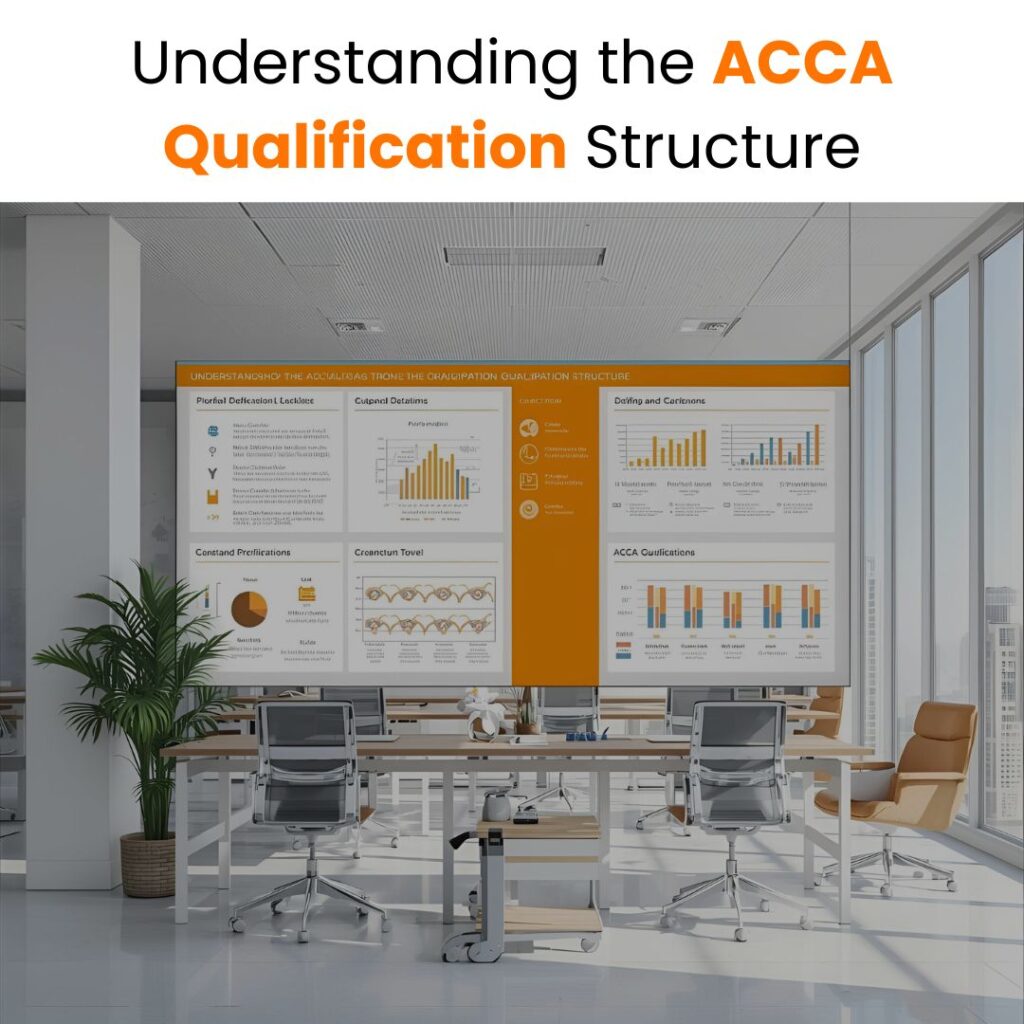Appearing in the ACCA exam is the best way to reach your goal. But attempting the exam is not enough until you have covered the basic understanding of the ACCA qualification structure. This article will guide you through the ACCA qualification structure and make it even simpler and clearer for you to understand in less time. Now let’s read.
At its core, the qualification of the ACCA structure is divided into three levels and a working experience pillar that runs alongside your exam
Applied knowledge (3 papers)
Applied skills (6papers)
Strategic professional 4 papers 2 compulsory, 2 optional)
Ethics and professional skills module (EPSM) online.
Practical experience requirement(PER): 36 months + 9 months objectives.
You became an ACCA member after passing all the exams, completing EPSM, and fulfilling the PER 36 months in relevant roles with sign-off. This framework is the same globally, including the ACCA qualification structure in Nepal.
ACCA levels explained (what you study and when)
Here is how the levels connect and what you actually learn:
Applied knowledge
It is a foundation in business, management, accounting, and finance.
It is great for school leavers and beginners who want structured basics before moving to skills.
Applied skills
Takes you deeper into financial reporting, taxation, audit and assurance, performance management, and financial management, core skills for any finance role.
Strategic professional
Essential compulsory: strategic business leader(SBL) and strategic business reporting(SBR).
options(choose two): advanced financial management (AFM), advanced performance management( apm) advanced taxation(atx), advanced audit and assurance (aaa)
These three levels of progression, plus EPSM and PER, are the backbone of ACCA course structure everywhere, including Nepal.
ACCA syllabus 2025: what’s new from September 1, 2025.
From September 1, 2025, to August 31, 2026, you will sit the 2025?26 syllabus. The structure of level and exam formats remains familiar: updates focus on content refreshers, for example, IFRS developments and continuing emphasis on technology, data, ethics, and sustainability. If you prepared under 2024/25 and now switch to 2025/26, ACCA provides an informative PDF to check the changes paper by paper.
Independent providers summarise the 2025 emphasis as: sharper syllabus alignment with real-world reporting (e.g., updated IFRS coverage), more applied and scenario-based assessment, and ongoing integration of digital/ESG themes, especially relevant for SBR and at Strategic Professional. (Always verify specifics against ACCA’s official syllabus pages for your paper.)
Eligibility for ACCA in Nepal: a form where you can start
Most of the students in Nepal enter ACCA after 2+(grade 12). If your academic background does not fulfill the eligibility requirements. Acca Foundation Awards offer a stepping stone into applied knowledge. For the official eligibility guidance, use the ACCA minimum entrance requirements, checks to confirm your starting point, and any exemptions you might qualify for. Local colleges in Nepal commonly accept wth English and maths for starting at applied knowledge.
How to study ACCA in Nepal practice routes
If you are searching for how to study ACCA in Nepal, you have three pathways
- Approved learning partners(ALPs) are Kathmandu, Kahra, and other hubs.
- Offered structured classes(on-campus or online), mentoring, mocks, and adm help wth exam entry.
- Give the structure classes on campus, mentoring, mocks, and admin help with exam entry.
- It is highly beneficial for first-time students who benefit from scheduled teaching and local support.
Self-study + official resources
- Combine the ACCA syllabus and past exam resources with approved textbooks and question banks.
- It works well if you need flexibility around work and other studies.
Blended learning
- Many Nepalese students take tuition for tough papers( for example, SBR/SBL/AFM) and study those they are comfortable with.
- No matter what the route is, follow the official syllabus and exam windows, and schedule EPSM to support you at the strategic level and establish early.
Study timeline: how long it take to complete ACCA?
Many of the students in Nepal complete ACCA in 3-4 years, depending on the person’s study speed, working status, and study intensity. Because the CBE runs quarterly for many papers, you can pace your study journey strategically, for example,1-2 papers per session, while working faster if you are full-time. Remember, PER(36 months) can run in parallel with your studies, so getting relevant internships or junior early roles can accelerate your membership timeline
Smart sequencing for Nepalese students (want to take when)
Applied knowledge builds your solid base and exam techniques( CBEs, objective testing).
- Applied skills bridge papers with plenty of practice questions. If you are working, consider one paper per session for consistency.
- Epsm do it before or alongside early strategic papers, its professional skills directly lift your SBL/SBR performance.
Strategic professional:
- Sit SBR before AAA, because AAA assumes SBR knowledge.
- Choose options aligned with your career (AFM/APM/ATX/AAA). Audit/assurance track? AAA. Corporate finance/treasury? AFM. Performance consulting/analytics? APM. Tax practice? ATX.
What is the syllabus shift in 2025 for your day-to-day prep?
For sittings from 1 September 2025, your plan should reflect:
Current syllabus for each paper(download the fresh guides)
- Incremental content updates (e.g., IFRS changes, ethics/tech/sustainability cases).
- Scenario-based practice: build speed at reading requirements, structuring answers, and applying standards/techniques to unseen contexts.
If you prepped with 2024/25 material, cross-check ACCA’s “what’s changed” document before you lock your study plan.
Registration process for the ACCA exam in Nepal
Create my ACCA, upload ID/academic proof, pay the registration fee, and keep the subscription current.
Arrive early to secure your preferred seating and avoid the late fee.
ACCA fees are paid online by myACCA for the local tuition or exam-related services handled by partners, for example, venue logistics. Many of the institutes in Nepal can accept the common local methods. Always follow the instructions of the specific organizations handling that payment.
Conclusion
The ACCA qualification is designed simply, but it can lead to powerful changes. Three progressive exam levels, an ethics module that keeps sharpening your professional mindset, and 36 months of actual working experience to solidify your skills. For the ACCA qualification structure in Nepal, your pathway mirrors the global standard: start your academic allowance, select your learning approach that suits your life, and pace your exams around Nepal’s thriving tuition ecosystem and your work commitments.
Frequently asked questions
What are the fees for ACCA in Nepal?
The fee for ACCA in Nepal is fixed for subscription and registration fees, but the tuition fee may vary depending on the learning provider you choose. It takes 4-5 NPR to prepare for the ACCA, despite exam and registration fees.





